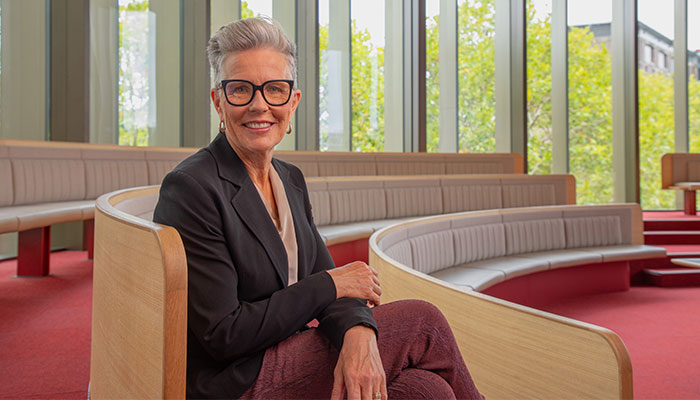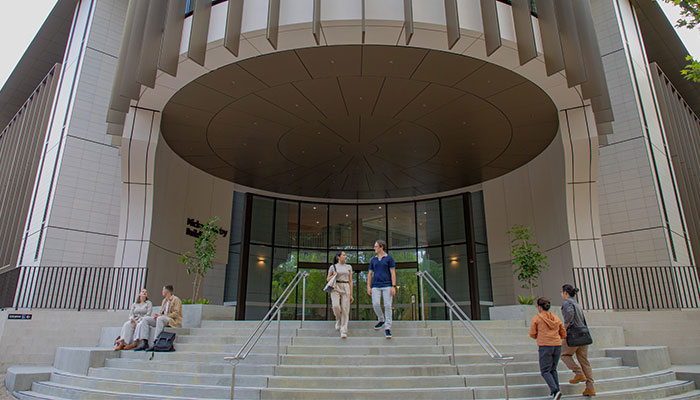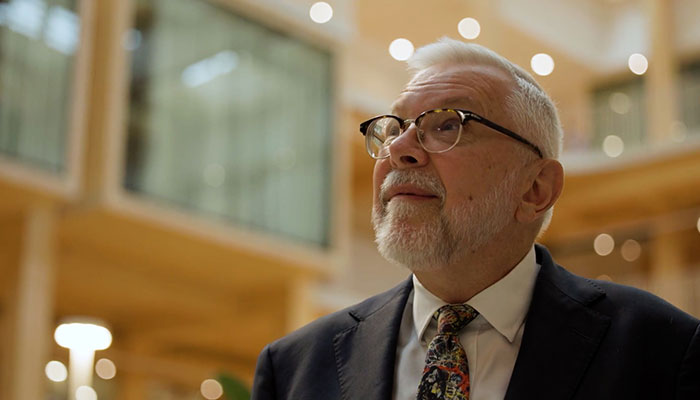When clerkship announcements roll around each year, Law School students feel the weight of expectation — and disappointment — if they don’t receive an offer. But Professor Lise Barry, Dean of Macquarie Law School, says there are many ways to build a rewarding career, both within law and beyond.

“Life does not begin and end with a clerkship,” Professor Barry says.
“There's a very small number of clerkships for a large number of graduates, and that’s always going to be the case, but there are lots of other pathways to consider.”
Last year, Professor Barry posted this sentiment on LinkedIn, and it quickly went viral, with dozens of reposts and hundreds of supportive comments from former graduates, who shared their own varied career journeys and experiences.
Skills that open doors
Melanie Marks is a Macquarie alumna and now works as Director of elevenM, an organisation that provides privacy, cyber security, AI and data governance solutions. She said Macquarie University produces lots of data protection gurus because they are educated to be curious and care about people, as well as being able to respect legal argument, all while thinking outside the square.
“Your skills in law give you unparalleled strengths in this field. Law school is a gruelling time, worrying about your pathway in… believe in yourself and start anywhere and you will find your path,” she said.
Perseverance is key too, as Special Counsel at Johnson Winter Slattery, Emily Lau, explained. She took the old-fashioned approach when she missed out on a clerkship.
My advice would be to think about what motivates you — it’s very rarely that the answer will be money — or poring over documents for long hours. Think about what brings you joy, and what will give you a good work-life balance.
“I was a law student at Macquarie and did not receive a clerkship offer. I handed out CVs to law firms in the city saying I was interested in a paralegal role that summer. A role opened up at one of the law firms where I had handed in a CV that day. That was how I got my first law firm job. A clerkship is a great opportunity but simply one of many ways to gain work experience as a law student,” she said.
Professor Barry adds that a law degree helps you understand how the world works, so the options are really unlimited. “Law affects everything we do, and if you have that knowledge then you're more in control of your business, your employees, your art and your future – whatever it might be.”
A law degree also equips graduates with excellent transferable skills – such as critical thinking, problem-solving, writing and communication skills – that are highly valued across a wide range of professions. From policy and advocacy to corporate and non-profit work, a legal education provides versatile skills that open doors across industries. Understanding how law intersects with business, technology, and social impact can help students identify opportunities that align with their strengths and passions.
The benefits of unconventional pathways
Professor Barry’s own career demonstrates the varied pathways a law degree can take. She has worked in multiple sectors, developing rich and diverse experiences throughout her career that eventually led to — and inform — her current role as Dean of Macquarie Law School.

Twists and turns: Professor Lise Barry came to her position as Dean at Macquarie Law School from a varied professional background, raising four children while working and studying.
After graduating with a degree in Arts and Social Science, she began working with homeless youth and teaching community work, and spent 15 years as a Youth Justice Conference Convenor, which then led her into mediation roles. She also worked as a Guardian Ad Litem, where she supported a range of vulnerable groups, from young people in care, to people in incarceration, and older people having issues with powers of attorney.
“That's a topic I took up eventually with my PhD in law too,” she says. “I was looking at how lawyers work with older people with cognitive impairments. So my career took a lot of twists and turns, but there's a common thread there — I was drawn to the law as a way to positively impact the lives of those I worked alongside.”
Professor Barry studied law at Macquarie as a mature-age student. After graduating, she began working as a Senior Lecturer.
“I wasn't full-time at Macquarie until 2012, then I moved into the Director of Education position, and then into the Dean role from there. So it's been an unconventional pathway into Deanship as well,” she says.
“I wouldn't call myself a career academic, but I'm also not a career lawyer — I'm somewhere in between. In between working and studying I was also busy raising four children, so I am used to balancing lots of different things and pursuing different threads of interest.”
Celebrating 50 Years of Macquarie Law School
This year, Macquarie Law School marks its 50th anniversary, a milestone that offers an opportunity to reflect on the impact the school has had over five decades. Professor Barry says the anniversary is not just a celebration of history but also a chance to reaffirm the school’s commitment to innovation and excellence in legal education.
- Kirby building inspires next generation of legal minds
- Future jobs: "Students who can apply technology to solve legal problems will be best positioned."
“When I speak with our alumni, they can't believe how far Macquarie has come. I know some of the people who graduated from the very first class and those early students speak so fondly of their time at Macquarie," Professor Barry says.
“Many of our graduates have risen to roles as partners or CEOs of some of the biggest Australian and global law firms, others are serving as politicians or judges. We have a large number of graduates who are members of the judiciary.
“Seeing how they've risen through the ranks at the same rate as graduates from other universities should inspire our current graduates to realise they can be anything they want to be.”
How to navigate early career decisions
For students currently navigating the uncertainty of clerkships and early career decisions, Professor Barry says it’s important to think about what will make them feel happy and fulfilled in the long term.

Fifty years: The Macquarie Law School anniversary is an opportunity to celebrate it's history as well as a chance to reaffirm the school’s commitment to innovation and excellence in legal education, Professor Barry says.
“My advice would be to think about what motivates you – it’s very rarely that the answer will be money, or poring over documents for long hours. Think about what brings you joy, and what will give you a good work/life balance. We all need to think about how we want to be remembered, and it’s usually not about working yourself into the ground.”
Professor Barry says it’s also vital for students to get a well-rounded experience during their time at Macquarie, looking beyond lectures and exams.
“The students who get the most out of their degree are the ones who really throw themselves into everything the university has to offer, such as volunteering at the Law Student Society, staying back for mooting and building a good community network.”
As students look to their futures, Professor Barry says it is important to be confident and optimistic. The challenges of entering the legal profession are real, but so are the opportunities. With determination and a willingness to explore, students can build careers that reflect both their talents and their values.
Macquarie Law graduate Professor Talal Yassine AM agrees, recalling his own early setbacks.
“I got rejected for 100 per cent of my clerkship applications, and I thought it was career-ending before I even started,” Professor Yassine says. “Nothing was further from the truth. You just have to take a different path to where you want to aim.”
Professor Lise Barry, Dean of the Macquarie Law School, was appointed in July 2022, having previously served as Deputy Dean (2019-2021) and Director of Education (2015-2021). Professor Barry came to academia from a professional background working in mediation and Youth Justice Conferencing.



